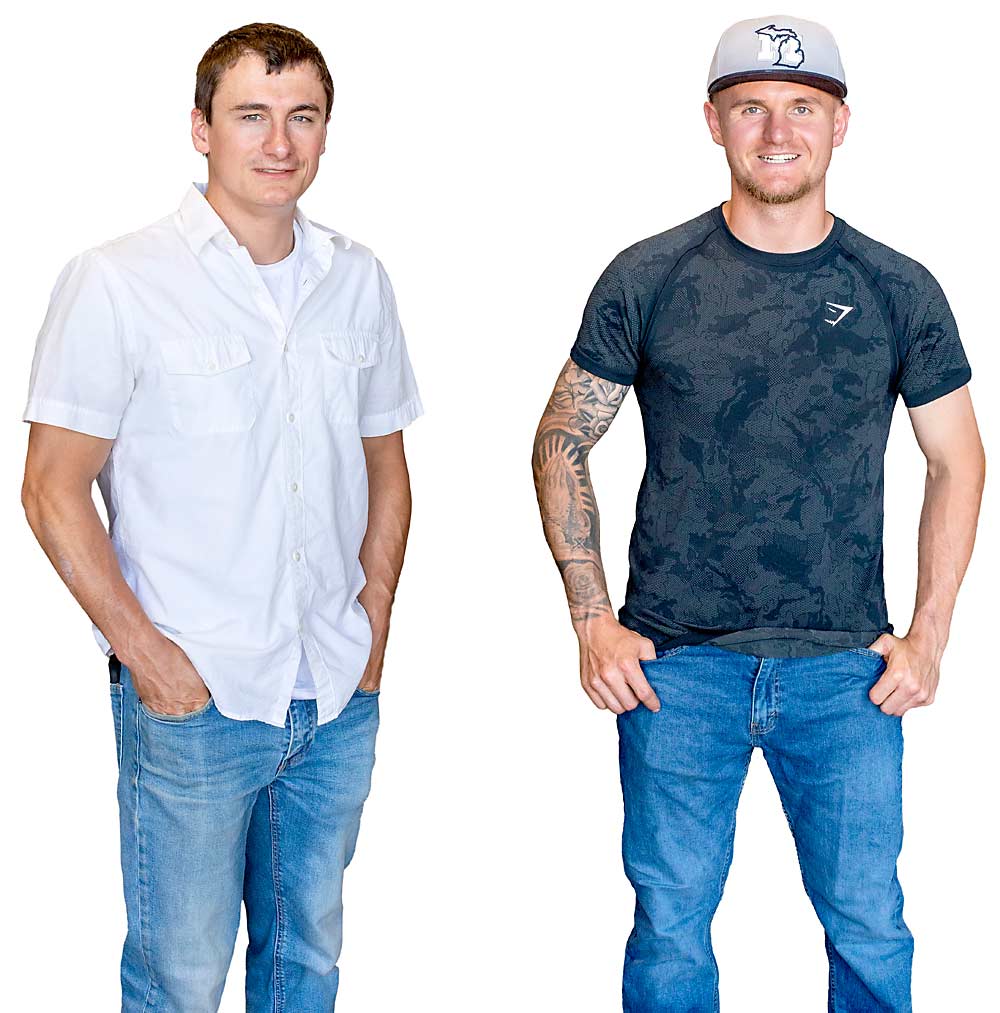family background/Brandt went to Albion College in Michigan and Trent went to Lourdes University in Sylvania, Ohio, both studying business. They are the sons of Mary Pat and Jim Swindeman.

age/from left: Brandt, 27, and Trent, 26
hometown/Deerfield, Michigan
crops/apples
business/Applewood Orchards
What are you doing since returning from college?
Brandt:
I’ve been done with school for more than four years, and I’ve been working wherever it’s busiest. I’m outside helping with harvest, spraying, irrigation, or inside, on the line or moving apples from storage to the packing plant on the forklift.
One of the things I don’t like, that I sometimes have to do, is digging holes up along the woods where there’s plenty of mosquitoes. I’ve also been helping out with the wind machines and hail cannons, because it’s a responsibility where you need to be on your “A” game. I like the challenge of taking care of problems, fast.
Trent:
I’m mainly in the packing plant, usually helping tag pallets because every pallet has to be put on a truck with the quantity and variety. When I’m not packing, I’m usually outside helping.
Probably the worst job that I’ve ever had on the farm was pulling up root suckers by hand. Every single tree seems to have root suckers, and I remember doing that for two weeks straight and it was the worst two weeks in my life.
I’m in the packing plant now, and I’ve always challenged myself to become better. Granted, this job is going to be a lot more work, but it’s a family business – that’s what you’ve got to do – whatever it takes.
What’s it like farming in Southeast Michigan?
Brandt:
Deerfield has a lot of flat land. Compared to the west side of Michigan, I’d describe it as more row crops and not as many apple growers. The biggest difference between us and other areas is the flat land. Next to no hills.
There are a few smaller apple growers here, but they are focused on giving customers an experience with pick-your-own and cidermaking. That’s not what we do. As a family, I think we look at industry changes and support innovators.
I think we’re pretty progressive, trying stuff out. Even with varieties, we’ll have different tests in rows, then in storage. We also test new products that may help us store apples better.
Trent:
Another big difference that I’ve noticed is when I go up to Sparta, where my Uncle Scott is, growers up there have a lot more workers. They have a lot more hands on deck, as opposed to where our location is.
We pretty much have to take whoever we can get and work around the labor challenges. When we are missing two or three people in the packing plant on busy days, it makes a world of difference.
So we need to always put ourselves in other people’s shoes and be able to retain a lot more employees to make the work days a lot less stressful.
What advice would you have for other young growers?
Brandt:
Be open-minded about your work. You can apply that perspective to a lot of different stuff on the farm, because no one knows it all. And that includes yourself. Just be willing to listen to others and be willing to try to change things that you’re familiar with.
You might be doing some job in a particular way, but there could be something else out there for you to learn and apply in a different way.
Trent:
I want to help out and give back. I’ve seen my dad and uncles work here their whole life, so I want to keep that family legacy going as best as I can. Make sure you put in the work early, because when I was younger, I used to goof off a lot and not work as much as I could have.
The biggest challenge for me is looking at the success of the family business, then try to look and see how you’re going to continue that success down the road.






Leave A Comment